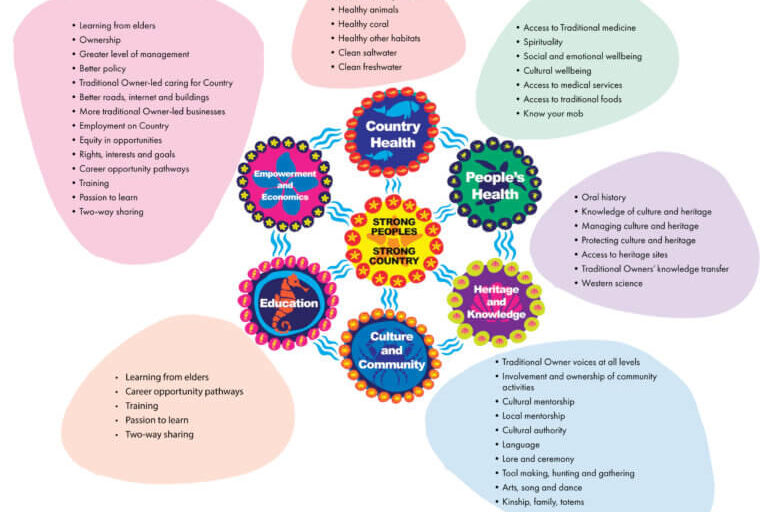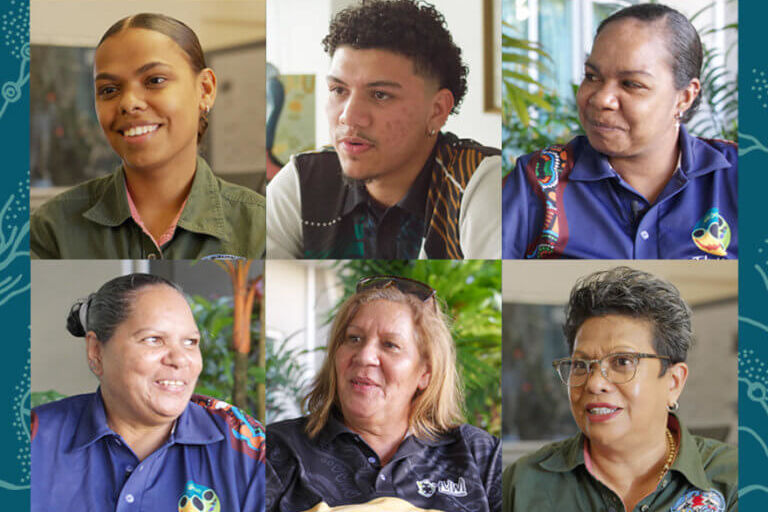As Traditional Owners, observing and monitoring trends on Country is something that's always been done. Their monitoring is grounded in a holistic view, where people, culture and Country are deeply connected. Right now, across the Reef and its Catchments, Traditional Owners are working with government, science and research organisations to weave Traditional Science with Western Science - two ways of knowing - to create better outcomes for Country. But to do this, they need to make sure their unique Traditional Knowledge can integrate with Western science and data systems.
The question is, how do they do this and still ensure that they're able to collect, report on - and protect - their own monitoring data and stories, in their own way?
#The creation of Strong Peoples-Strong Country framework
Since the establishment of Western management systems, there have been a lot of programs to monitor the condition of Traditional Owners' sea Country. But few have included, or properly reflected, their perspectives and values as Traditional Owners. They needed a new and innovative approach that was culturally grounded in a holistic perspective of Healthy Country, Healthy Peoples.
That's where the Strong Peoples-Strong Country (SP-SC) monitoring framework comes in. As part of the Australian and Queensland Government's Reef 2050 Integrated Monitoring and Reporting Program, SP-SC is a Traditional Owner-led and co-designed framework for monitoring the health and condition of the Great Barrier Reef. The framework is designed to show the inherent inter-connectedness of Traditional Owners and Country, by connecting the health of their land and sea Country to the quality of life of Traditional Owner communities around the Reef.
Data collected using the framework reflects the social, cultural, health, economic and environmental aspects of their communities. In some ways, the knowledge, stories and data collected using the framework make it a kind of modern knowledge keeper for participating Traditional Owner communities.

The Strong Peoples-Strong Country Framework with the related indicators for each hub. Artwork: © Mallie Designs.
#The role of community-based researchers
Pilot projects to test the Strong Peoples-Strong Country Framework in communities have employed community-based researchers, called Community Research Assistants (CRA), to help identify monitoring indicators with community members, and collect, manage and analyse the data using those indicators and report the findings back to their community.
The pilot projects found that the CRA model placed a lot of responsibility on a single person, and that it was better for the role to be more broadly embedded within the community organisation. Each pilot group tailored the model in a way that worked for them. Some organically shifted to a shared position, pairing an older, more experienced person with strong community connections and cultural knowledge with a younger, tech-savvy individual. The pilots found that it is vital for the program to have support across the organisation - from the board to community members - and the researchers play a key role in linking community members together to build broad community support.

Community-based researchers from the pilot communities. Top left, Kathy Wymarra (Wuthathi), Ki-Shaun Fejo (Goondoi), Trudie Salt and Pamela Salt (Jabalbina), Bronwyn Tonga (Yuwi), and Yodie Batzke (Wuthathi). Not pictured is Josh Gibson (Yuwi).
Community-based researchers responsibilities fall into two main categories - logistical and technical. The logistical portion focuses on community engagement and building relationships with their community, Elders and corporation boards. The technical side of the role involves working with data collection and management specialists Environmental Systems Solutions to create, manage and fine-tune their database so it's able to work with Western and cultural data and information. This includes ensuring that the system can work with cultural protocols for Traditional Ecological Knowledge, which has rules about who is and is not allowed to access certain kinds of information. By combining the two knowledge systems, they're able to create new and innovative ways to better heal and protect the Reef and its Catchments.
To do this important work, community-based researchers need a diverse mixture of skills and experience including strong computer, data and technical skills, as well as cultural knowledge and connections to their communities to talk to people and gather stories and information. The pilot projects found that this unique mixture rarely exist in one individual, and it's helpful for the role to be shared.
#The big picture benefits of the Strong Peoples-Strong Country program
The Strong Peoples-Strong Country program - and the work of community-based researchers - allows governments, researchers and scientists to recognise the value and importance of their unique knowledge and data. This is leading to more Traditional Owner-led projects, on-going funding opportunities, capacity development, employability and a stronger Traditional Owner voice in decision-making for the Reef.






